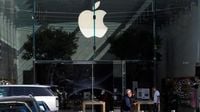In a significant turn of events, Alphabet Inc., the parent company of Google, faces potential restructuring as Apple Inc. considers moving away from Google as the default search engine in its Safari browser. This shift comes amid ongoing scrutiny in a U.S. antitrust lawsuit that questions Google's monopolistic practices in the search engine market.
On May 7, 2025, Eddy Cue, Apple’s Senior Vice President for Internet Services, testified in court, revealing that Apple is actively exploring the integration of AI-powered search services, such as ChatGPT and Perplexity, into Safari. Cue’s statements not only hinted at a strategic realignment for Safari but also sent Alphabet’s stock tumbling by 7.3 percent, reflecting investor concerns over the future of the lucrative partnership between the two tech giants.
Currently, Google pays Apple approximately $20 billion annually to remain the default search engine on iPhones and iPads. This arrangement is crucial for both companies: for Apple, it represents a significant revenue stream, while for Google, it solidifies its dominance in the search market. However, Cue’s comments about a decline in traditional web searches in Safari—attributed to the growing use of AI services—have raised alarms. "In April 2025, there was a decline in classic web searches in Safari," Cue stated, emphasizing the changing landscape of online search.
According to analysts, this $20 billion deal constitutes around 36 percent of Google’s search advertising revenue generated through Safari. The potential loss of exclusivity could have severe implications for Google, with analysts warning that advertisers might redirect their budgets to other viable search alternatives if they emerge. Gil Luria, an analyst at D.A. Davidson, remarked, "The loss of exclusivity at Apple could have very serious consequences for Google, even if no further actions are taken."
While Apple has not committed to ending its partnership with Google, Cue acknowledged the need to adapt to technological shifts. "In ten years, you might not need an iPhone anymore—crazy as that sounds," he remarked, highlighting the transformative impact of AI on consumer technology. This sentiment underscores a broader industry trend, where traditional devices and services may soon be overshadowed by innovative AI solutions.
Despite the potential benefits of integrating AI search technologies, analysts caution that Apple must tread carefully. Ending the partnership with Google would require Apple to find alternative revenue sources to replace the $20 billion it currently receives. "The agreement is financially simply the best," Cue noted, indicating that Apple is not rushing into any decisions that could jeopardize its financial stability.
Moreover, the U.S. Department of Justice’s antitrust lawsuit against Google argues that exclusive agreements, like the one with Apple, stifle competition in the search engine market. The lawsuit aims to dismantle these arrangements, which the government claims reinforce Google’s monopoly. As part of this legal battle, Cue’s testimony could be seen as an attempt to position Apple favorably in front of regulators by highlighting the potential for competition in the search space.
In the courtroom, Cue's statements have already had a notable impact on the market. Following his testimony, Alphabet’s stock fell by more than 8 percent on the day, while Apple also experienced a temporary drop of 2.5 percent. This reaction underscores how intertwined the fortunes of both companies are and the delicate balance they must maintain in their partnership.
As Apple explores new avenues for search technology, it has already initiated discussions with alternative AI service providers. Reports indicate that Apple has held talks with Perplexity and is also integrating ChatGPT into its Siri virtual assistant, further signaling a shift toward AI-driven user experiences. Additionally, Apple is considering incorporating Google’s own AI tool, Gemini, into its offerings.
While Google is also working on enhancing its search capabilities with AI-generated summaries, the competitive landscape is evolving rapidly. As Cue noted, the rise of AI search tools could fundamentally alter how users interact with the web, potentially diminishing Google’s historical dominance. "Before AI, it felt like none of the alternative providers were a real option," Cue stated, acknowledging the growing viability of AI-driven search solutions.
The ongoing legal proceedings and the shifting dynamics between Apple and Google raise critical questions about the future of search technology and the implications for consumers. If Apple successfully integrates AI search services, it could redefine user expectations and experiences in ways that challenge traditional search paradigms.
As the situation unfolds, both companies are at a crossroads. Apple must navigate the complexities of its relationship with Google while exploring innovative technologies that could reshape the search landscape. Meanwhile, Google faces the dual challenge of defending its market position in court and adapting to a rapidly changing technological environment.
In conclusion, the potential for a significant shift in the search engine market is on the horizon, driven by advancements in AI and evolving consumer preferences. The outcome of the antitrust lawsuit and Apple’s strategic decisions in the coming months will be pivotal in determining the future of both companies and the broader tech industry.


